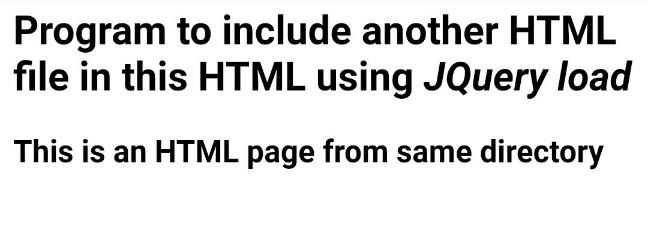如何在HTML文件中包含另一个HTML文件
在本教程中,我们将学习如何在HTML文件中包含另一个HTML文件。
有多种方法可用于在HTML文件中包含另一个HTML文件。让我们快速浏览一下网络上支持的技术。
使用JQuery的load方法来包含HTML文件
在本节中,我们将介绍如何使用JQuery的load方法来包含一个HTML文件。
用户可以按照下面的语法使用这个方法。
语法
$(wrapper).load(htmlfile);
包装器附加了jQuery加载的新HTML文件。
参数
- wrapper − 包含新HTML内容的DOM元素的ID。
- htmlfile − 新HTML文件的名称。
示例
该程序需要两个HTML文件。一个是主HTML文件,用于加载新的HTML文件。接下来是新的HTML文件。将两个文件都放在确切的位置。
在主HTML文件中定义一个包装器DOM元素,以附加新的HTML文件。使用jQuery加载技术加载新的HTML文件并将其设置在包装器DOM元素内。
内部HTML文件
<html>
<body>
<h3>This is an HTML page from same directory</h3>
</body>
</html>
主HTML文件
<html>
<head>
<script src="https://code.jquery.com/jquery-1.11.3.min.js"></script>
<script>
(function() {("#includeHtml").load("result.html");
});
</script>
</head>
<body>
<h2>Program to include another HTML file in this HTML using <i>JQuery load</i></h2>
<div id="includeHtml"></div>
</body>
</html>
输出

使用w3-include-html属性来包含一个HTML文件
在这个部分,让我们来看看如何使用w3-include-html属性来包含一个HTML文件。
用户可以按照下面的语法来使用这个方法。
语法
<div w3-include-html="filename.html"></div>
包括一个带有属性w3-include-html的包装DOM,其值为新HTML文件的文件名。
//Read the attribute
fileName = domEl.getAttribute("w3-include-html");
//Make XMLHttpRequest with the attribute value
xmlHttp = new XMLHttpRequest();
xmlHttp.onreadystatechange = function() {
//If the request is successful, load the new HTML. Else throw 404 error and try again
if (this.readyState == 4) {
if (this.status == 200) {domEl.innerHTML = this.responseText;}
if (this.status == 404) {domEl.innerHTML = "Error 404";}
/* Remove the attribute and invoke the function again*/
domEl.removeAttribute("w3-include-html");
addHTML();
}
xmlHttp.open("GET", fileName, true);
xmlHttp.send();
语法读取w3-include-html属性值,并使用XMLHttpRequest加载新的HTML。
示例
在这个例子中,创建一个新的HTML文件和一个默认的HTML文件。默认的HTML文件包含一个带有w3-include-html属性的div元素,该属性包含新的HTML文件名。
程序读取w3-include-html属性值,使用文件名进行 XMLHttpRequest 并加载文件。
成功加载文件后,一个新的HTML文件会在w3-include-html的包装DOM中渲染。否则,用户会收到错误提示,并且程序会重新加载文件。
内部HTML文件
<html>
<body>
<header><b>HTML 2 HEADER</b></header>
<div style="height: 100px;"></div>
<footer><b>HTML 2 FOOTER</b></footer>
</body>
</html>
主要HTML文件
<html>
<body>
<h2>Program to include another HTML file in this HTML using <i>w3-include-html</i></h2>
<div w3-include-html="result.html"></div>
<script>
function addHTML() {
var el, i, domEl, fileName, xmlHttp;
/*Iterate all DOM*/
el = document.getElementsByTagName("*");
for (i = 0; i < el.length; i++) {
domEl = el[i];
/*find the element having w3-include-html attribute*/
fileName = domEl.getAttribute("w3-include-html");
if (fileName) {
/*http request with attribute value as file name*/
xmlHttp = new XMLHttpRequest();
xmlHttp.onreadystatechange = function() {
if (this.readyState == 4) {
if (this.status == 200) {
domEl.innerHTML = this.responseText;
}
if (this.status == 404) {
domEl.innerHTML = "Page not found.";
}
/* Remove the attribute and invoke the function again*/
domEl.removeAttribute("w3-include-html");
addHTML();
}
}
xmlHttp.open("GET", fileName, true);
xmlHttp.send();
/*function ends*/
return;
}
}
}
addHTML();
</script>
</body>
</html>
输出

使用htmlinclude库包含HTML文件
在本节中,我们将学习如何使用htmlinclude库来包含一个HTML文件。
用户可以按照以下的语法使用这个方法。
语法
<script src="library.js"></script>
语法向HTML文件添加了javascript库文件的URL。
<include src="./result.html"></include>
include标签的src属性包含新的HTML文件名。
//Getting include attribute value
let includes = document.getElementsByTagName('include');
for(var i=0; i<includes.length; i++){
let include = includes[i];
//Loading include src value load_file(includes[i].attributes.src.value, function(text){
include.insertAdjacentHTML('afterend', text);
include.remove();
});
}
function load_file(filename, callback) {
fetch(filename).then(response => response.text()).then(text => callback(text));
}
语法使用fetch方法加载标签”include”的源代码。
例子
在这个例子中, htmlinclude 库被包含在头部中。创建一个包含标签,将新文件名作为src属性值。
关于脚本部分,使用fetch方法加载包含标签的src值。如果使用fetch时出现错误,请尝试从node.js或其他程序IDE获得帮助。
内部HTML文件
<html>
<body>
<b>htmlinclude library included this HTML file</b>
</body>
</html>
主HTML文件
<html>
<head>
<script src="https://unpkg.com/htmlincludejs"></script>
</head>
<body>
<h2>Program to include another HTML file in this HTML using <i>htmlinclude library</i></h2>
<include src="./result.html"></include>
<script>
let includes = document.getElementsByTagName('include');
for (var i = 0; i < includes.length; i++) {
let include = includes[i];
load_file(includes[i].attributes.src.value, function(text) {
include.insertAdjacentHTML('afterend', text);
include.remove();
});
}
function load_file(filename, callback) {
fetch(filename).then(response => response.text()).then(text => callback(text));
}
</script>
</body>
</html>
输出

使用 iframe 包含一个 HTML 文件
在这一部分中,让我们看看如何使用 iframe 来包含一个 HTML 文件。
用户可以按照下面的语法来使用这种方法。
语法
<iframe src="new.html"></iframe>
通过在src中包含新的HTML文件名,iframe标签将其包含在内。
示例
在这个示例中,创建一个示例HTML文件,以包含和主HTML文件。该方法在新的HTML主体中添加一个iframe,并将新的HTML文件名作为源值。
iframe在主HTML文件中加载新的HTML内容。
内部HTML文件
<html>
<body>
<div style="background-color: skyblue;">iframe included this HTML file</div>
</body>
</html>
主要HTML文件
<html>
<head>
<h2>Program to include another HTML file in this HTML using <i>iframe</i></h2>
<style>
iframe[iframetag] {
border: none;
}
</style>
</head>
<body>
<div id="iframeDiv">
<iframe src="result.html" iframetag></iframe>
</div>
</body>
</html>
输出

本教程介绍了在HTML文件中包含新HTML文件的四种方法。使用iframe方法实现简单。如果用户需要jQuery方法,可以选择jQuery的load方法。
 极客笔记
极客笔记